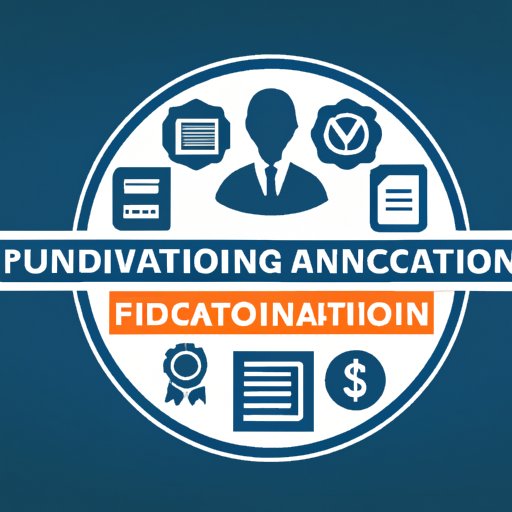Introduction
A financial advisor is a professional who provides advice and guidance to individuals and businesses on how to manage their finances and investments. Financial advisors are highly knowledgeable and experienced in areas such as taxation, retirement planning, estate planning, insurance, investments, and budgeting.
Having a qualified financial advisor is essential for anyone looking to achieve their financial goals. A financial advisor can help identify areas of improvement, create a plan for achieving those goals, and provide ongoing guidance and support.
Examining the Different Educational Requirements for Financial Advisors
The educational requirements for financial advisors vary depending on the type of services they offer. Generally, financial advisors should have at least a bachelor’s degree in finance, accounting, economics, or a related field. Many financial advisors also have master’s degrees in these fields.
In addition to academic qualifications, financial advisors must also meet certain continuing education requirements. These requirements vary by state, but generally, advisors must complete between 20-40 hours of continuing education every two years.

Exploring the Necessary Professional Certifications for Financial Advisors
While not all states require financial advisors to hold professional certifications, it is increasingly becoming the norm. The most common certification for financial advisors is the Certified Financial Planner (CFP) designation. To obtain this designation, advisors must pass a rigorous exam administered by the Certified Financial Planner Board of Standards.
There are other certifications available for financial advisors, such as the Chartered Financial Analyst (CFA) and the Chartered Investment Manager (CIM). Depending on the type of services they offer, financial advisors may also choose to pursue additional certifications, such as the Personal Financial Specialist (PFS) or the Accredited Investment Fiduciary (AIF) designation.

Assessing the Relevant Skills and Knowledge Required of Financial Advisors
In addition to educational and certification requirements, financial advisors must also possess certain technical skills and knowledge. Financial advisors must be proficient in various software programs, such as spreadsheets and financial modeling software. They should also have a comprehensive understanding of financial instruments, markets, regulations, and tax laws.
Financial advisors must also possess certain soft skills, such as communication, problem-solving, and interpersonal skills. These skills are essential for providing advice tailored to individual needs and improving client relationships.
Finally, financial advisors must adhere to certain regulatory standards. These standards are established by regulatory bodies such as the SEC, FINRA, and NFA and are designed to protect consumers from potential risks.
Understanding the Benefits of Hiring a Financial Advisor with the Right Qualifications
Hiring a financial advisor with the right qualifications can offer many benefits. First, an experienced and qualified financial advisor can provide advice tailored to individual needs. This can help clients understand their current financial situation and develop strategies for reaching their long-term goals.
Second, having a qualified advisor can improve the chances of achieving financial goals. With the right guidance, clients can make informed decisions that will lead to greater success.
Finally, having a qualified financial advisor can increase protection from potential risks. A qualified advisor can help identify potential risks and recommend strategies for mitigating them.
Analyzing the Impact of Regulatory Standards on Financial Advisors’ Qualifications
Regulatory standards play a major role in defining the qualifications required of financial advisors. These standards are established by regulatory bodies such as the SEC, FINRA, and NFA and are designed to protect consumers from potential risks.
Adherence to these standards ensures that financial advisors are knowledgeable, experienced, and capable of providing reliable advice. This helps to ensure that clients receive the best possible advice and guidance when making important financial decisions.

Investigating the Difference Between Financial Advisors and Other Financial Professionals
Although financial advisors and other financial professionals both provide advice and guidance, there are key differences between their roles. Financial advisors are typically more comprehensive in the scope of their services, while other professionals may focus on specific areas such as investments or taxation.
Financial advisors also typically have a deeper understanding of the overall financial picture and can provide advice on a wide range of topics. On the other hand, other financial professionals may only have expertise in one particular area.
Evaluating the Importance of Soft Skills for Financial Advisors
Soft skills are essential for any financial advisor. Communication skills are necessary for effectively conveying complex concepts to clients. Problem-solving skills are important for identifying potential solutions to financial issues. And interpersonal skills are essential for building trust and developing strong client relationships.
These skills are just as important as the technical knowledge and qualifications that financial advisors possess. Without them, it can be difficult to provide effective advice and guidance.
Conclusion
Financial advisors provide critical advice and guidance to clients on how to manage their finances and investments. To ensure that clients receive the best possible advice, financial advisors must possess certain qualifications and certifications. This includes academic degrees, professional certifications, and relevant skills and knowledge.
Having a qualified financial advisor can offer many benefits, such as advice tailored to individual needs, improved chances of achieving financial goals, and increased protection from potential risks. Therefore, it is important to make sure that the financial advisor you hire has the necessary qualifications and certifications.
(Note: Is this article not meeting your expectations? Do you have knowledge or insights to share? Unlock new opportunities and expand your reach by joining our authors team. Click Registration to join us and share your expertise with our readers.)
